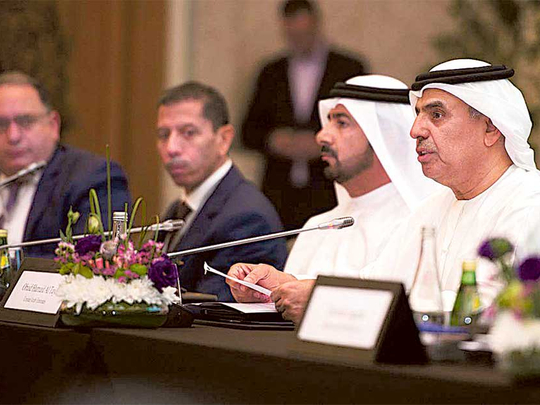
Dubai: Arab countries need to diversify their government revenue streams in the context of persistent decline in oil prices and need for governments to invest in economic growth and job creation, according to senior government officials and representatives of multilateral agencies speaking at the
second Annual Arab Fiscal Forum.
The Forum with the theme of “Revenue Diversification in Arab Countries” attended by finance ministers, central bank governors and senior government officials had the participation of the Arab Monetary Fund (AMF) and the International Monetary Fund (IMF).
In his welcome address to the Forum, Obaid Humaid Al Tayer, Minister of State for Financial Affairs of the UAE said current economic conditions pose a number of challenges that should be addressed by decision makers, in order to design appropriate policies that promote inclusive and sustainable growth. “This requires detailed and in depth studies that take into account local dimensions in light of international perspectives, as well as in accordance with international models and global best practices,” he said.
The minister stressed the significant role of financial policies in achieving sustainable growth and macroeconomic management, to ensure price stability, external balance, raising the level of employment, social justice, in addition to the traditional functions in security, defence and judiciary fields. In fact, these require deliberate interventions to the socioeconomic life.
“Good public finance management is measured based on several areas including fiscal policy effectiveness, safety and budget transparency. The biggest challenge faced by government spending is the balance in providing public services, achieving long-term fiscal sustainability, tax burden within a limit that does not affect growth,” said Al Tayer.
Revenue augmentation
In her keynote address at the forum, Christine Lagarde, IMF Managing Director said the current economic environment in the region resulting from persistent low oil prices is an opportunity to implement fiscal reforms focusing on government revenue augmentation and revenue diversification.
The Forum discussed policy options to promote inclusive and sustainable growth, including strategies to develop non-oil revenues, formulate equitable and efficient taxation policies, particularly value added tax (VAT), and highlighted regional and international experiences with significant tax reforms, including building a modern tax administration.
Addressing the Forum, Dr Abdul Rahman A. Al Hamidy, Director General Chairman of the Board of Executive Directors of the Arab Monetary Fund said the region needs a much higher rate of growth than the current rate to effectively address poverty and unemployment.
“The region needs GDP growth in the range of 5 to 6 per cent to address poverty and unemployment effectively. Last five years the region had an average growth of 3.3 per cent while this year the growth is estimated at around 3 per cent which is short of achieving our targets,” said Al Hamidy.
While the region faces an average fiscal deficit of 10 per cent, Al Hamidy said governments should work towards fiscal stability and improved growth through revenue augmentation and diversification.












